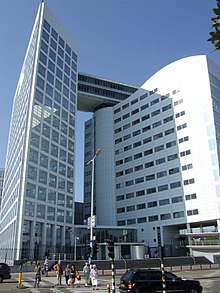प्रवेशद्वार:मानवाधिकार/Selected article

The International Criminal Court (ICC or ICCt) was established in 2002 as a permanent tribunal to prosecute individuals for genocide, crimes against humanity, war crimes, and the crime of aggression, although it cannot currently exercise jurisdiction over the crime of aggression. The Court came into being on July 1 2002 — the date its founding treaty, the Rome Statute of the International Criminal Court, entered into force — and it can only prosecute crimes committed on or after that date.
As of June 2008, 106 states are members of the Court. A further 40 countries have signed but not ratified the Rome Statute. However, a number of states, including China, India and the United States, are critical of the Court and have not joined.
The Court can generally exercise jurisdiction only in cases where the accused is a national of a state party, the alleged crime took place on the territory of a state party, or a situation is referred to the Court by the United Nations Security Council. The Court is designed to complement existing national judicial systems: it can exercise its jurisdiction only when national courts are unwilling or unable to investigate or prosecute such crimes. Primary responsibility to investigate and punish crimes is therefore left to individual states.
